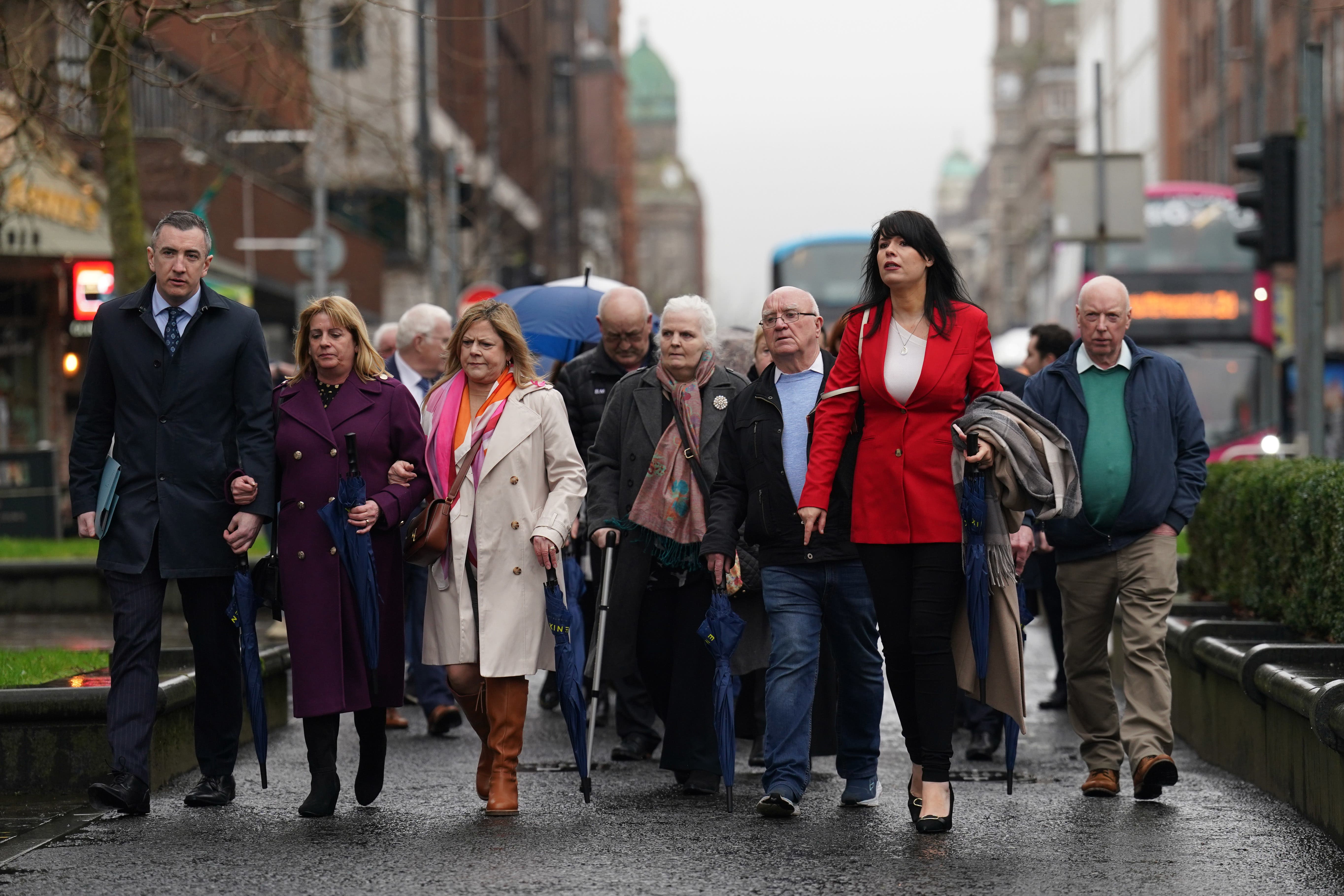Government remains ‘committed’ to Troubles Legacy Act despite judge’s ruling
Mr Justice Colton delivered a 200-page judgment on the controversial Act intended to deal with the legacy of the Troubles.

The Government has said it remains committed to its controversial Northern Ireland Troubles Legacy Act despite a High Court judge ruling that one of its key elements is unlawful.
Delivering a judgment at Belfast High Court, Mr Justice Adrian Colton ruled that the provision for conditional immunity from prosecution for Troubles offences in the Act is not compliant with the European Convention on Human Rights (ECHR).
The judge also said there was no evidence the immunity provision will in any way contribute to reconciliation in Northern Ireland.
However, he did rule that a new body set up to probe Troubles killings could carry out human rights-compliant investigations.
Speaking outside the court, the victims who took the legal challenge described their battle as “half won” and vowed to fight on, potentially to the Supreme Court.
Martina Dillon, whose husband Seamus was shot dead by loyalist terrorists in Co Tyrone, said she got “half my case today”, adding: “I have fought for 26 years and I will continue to fight on”.
Responding in the House of Commons, Northern Ireland Secretary Chris Heaton-Harris said: “We will consider Mr Justice Colton’s findings very, very carefully, but we do remain committed to implementing the Legacy Act.”
Solicitor Darragh Mackin, of Phoenix Law, who acts for the families, said the foundations of the Act were “eroded” by the court, and urged the Government to “go back to the drawing board”.
“The Secretary of State has indicated he will appeal. If so, we’re ready for it, this will go the whole way to the Supreme Court,” he added.
The Act received royal assent in September despite widespread opposition from political parties, victims’ organisations in Northern Ireland and the Irish Government.
Aspects of its laws included a limited form of immunity from prosecution for Troubles-related offences for those who co-operated with the new Independent Commission for Reconciliation and Information Recovery (ICRIR).
The new Act would also halt future civil cases and legacy inquests.
A number of Troubles victims launched the legal action challenging the human rights compliance of the Government’s Act.
Delivering his 200-page judgment, Mr Justice Colton referred to the provisions for immunity from prosecution.
He told the court: “I am satisfied that the immunity from prosecution provisions under Section 19 of the Act are in breach of the lead applicant’s rights pursuant to Article 2 of the ECHR.
“I am also satisfied they are in breach of Article 3 of the ECHR.”
He added: “There is no evidence that the granting of immunity under the Act will in any way contribute to reconciliation in Northern Ireland; indeed the evidence is to the contrary.”
Turning to the ICRIR, Mr Justice Colton said: “I fully understand the opposition to the new scheme and the reasons for it.
“That said, I cannot, at this remove, say the system established under the Act cannot provide an Article 2 and 3 compliant investigation.
“It has wide powers and wide range of discretion to carry out its reviews.
“Should it fall short of its obligations on Articles 2 and 3, I have no doubt they will be subject to the scrutiny of the court.”
He added: “The court is satisfied that the provisions of the Act leave sufficient scope for ICRIR to conduct an effective investigation as required under Articles 2 and 3 of ECHR.”
Delivering his conclusions, the judge said that the immunity from prosecution provisions in the Act should be disapplied.
He also ruled that a provision of the Act that no new Troubles-related civil claims may be brought after 18 November 2023 was incompatible with human rights laws and should be disapplied.
Speaking in the Commons, Shadow Northern Ireland secretary Hilary Benn said immunity from prosecution had been a central foundation of the Legacy Act.
He added: “What do ministers intend to do about this judgment and how can the Commission (ICRIR) become operational when one of its central powers has just been struck down?”
Mr Heaton-Harris replied: “As I say, this is a very complex case. Over 200 pages which were just being reported on less than 90 minutes ago, and so it will take some time to consider.
“But we do remain committed to implementing the Legacy Act, including delivering the ICRIR.”
Separately, the Irish Government has launched an interstate legal case against the UK Government over the Legacy Act, arguing that it breaches human rights laws.
Irish deputy premier Micheal Martin said that Ireland was “not surprised” by the High Court ruling.
“I think it reflects and, if you like, underpins the rationale for Ireland taking the case that we’ve taken.”
Bookmark popover
Removed from bookmarks